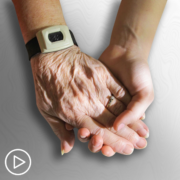Where Do Clinical Trials Fit Into an AML Treatment Plan?
Where Do Clinical Trials Fit Into an AML Treatment Plan? from Patient Empowerment Network on Vimeo.
AML expert Dr. Eunice Wang discusses the role that clinical trials play in advancing research, the benefits of participation in research, and explains why she recommends trials for AML patients.
Dr. Eunice Wang is the Chief of the Leukemia Service and Professor of Oncology at the Roswell Park Comprehensive Cancer Center in Buffalo, New York. Learn more about Dr. Wang, here.
Related Resources:

|

|

|
Transcript:
Katherine:
Where do clinical trials fit in when it comes to choosing treatment?
Dr. Wang:
Clinical trials are the mainstay of everything that we do in cancer care. Every single cancer drug that we’ve developed dating back into the 1970s at the National Institute of Health is the result of some patients and some doctors designing a clinical trial. These FLT3 inhibitors were developed over the last several years, so when I first came out of fellowship and started my training, we didn’t have these targeted therapies. Since 2017, in four years, we’ve had nine different drugs approved.
So, clinical trials are the way that we go from a finding in the laboratory to somebody having an extra birthday or going to their son or daughter’s wedding. That’s really how important it is, and those brave individuals who participate in clinical trials are helping not only themselves, but helping other people. I can’t tell you how many patients I enroll in clinical trials for AML, and I have told them – I said, “These nine drugs that we approved were because of nine different clinical trials which demonstrated benefit involving hundreds of thousands of patients.”
I can’t tell you how many times I’ve had a patient say to me, “Look, doctor, I’m going to participate in this clinical trial so that even if I’m not helped, you could learn something from me that could help the next person with their disease.” People are incredibly unselfish when it comes to clinical trials. I recommend a clinical trial for all my patients because I feel like that’s the cutting-edge clinical care.
I had patients here who I had on clinical trial drugs, and I was able to go to them and say, “Good news: Your drug has now been approved.” And, they say, “Doctor, why? I’ve been on this drug for a year.” And, I said, “That’s right, because you were part of that clinical trial, and you’re here now because of that drug, and now, a year or two later, that drug’s potency has been recognized, and now, the fact that you were in that trial has really helped us get this approval, which is going to help every other patient with that disease going down the line.” So, very important.










